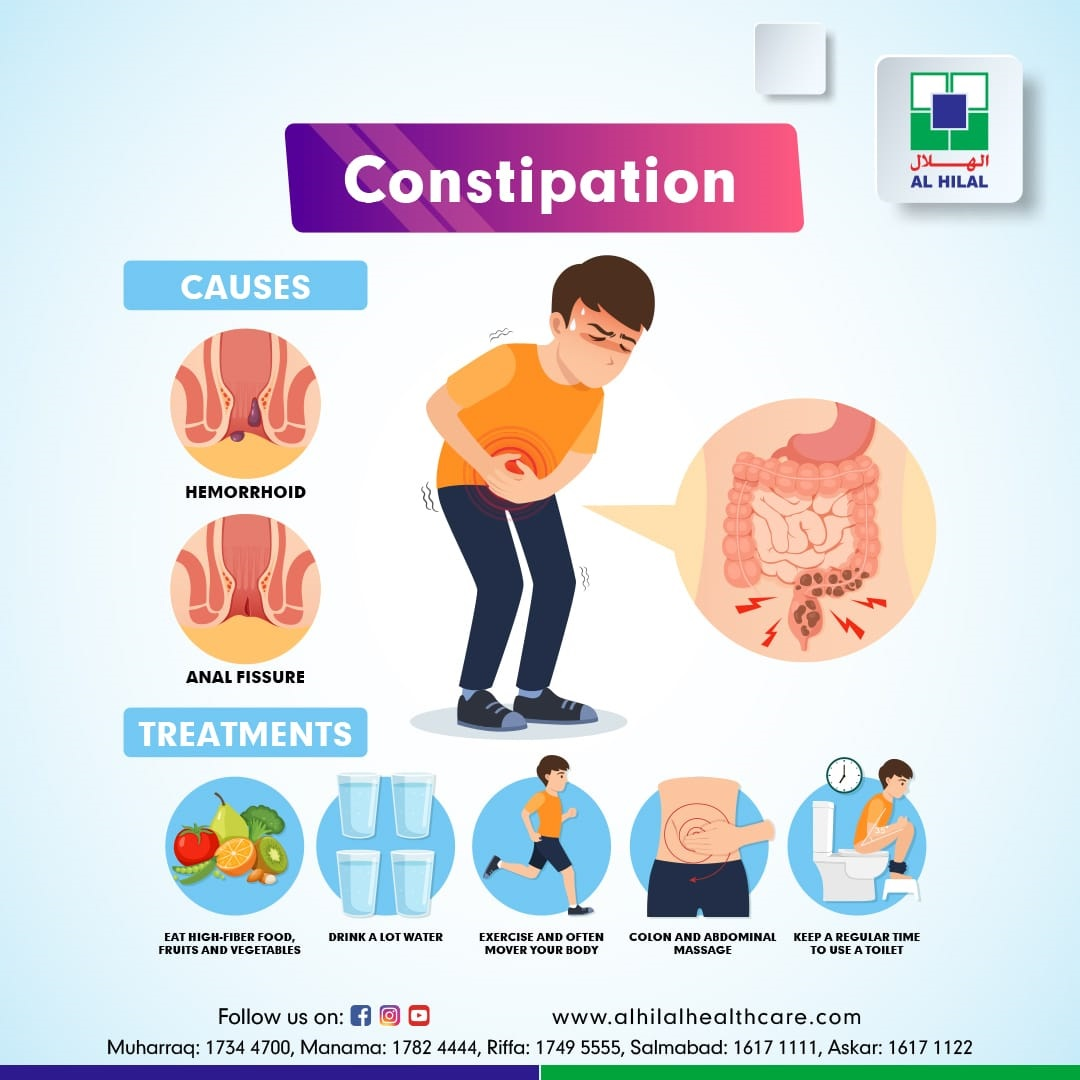Constipation is infrequent and unsatisfactory defecation fewer than three times per week. It happens when bowel movements become less recurring, and stools become hard to pass. It occurs most often due to modifications in routine or diet or due to insufficient intake of fiber. You should talk with your doctor if you have extreme pain, blood in your stools, or constipation that lasts more than three weeks.

Most of the time, constipation is not a disease; it’s a symptom.
Constipation has many causes and may be a symptom of an undiagnosed disease. In addition, constipation may last for a long or short period.
The fundamental features that generally define constipation include:
- Hard and dry stools.
- Feeling of not emptying your bowel fully.
- Painful bowel movements
- Difficulty in passing the stools.
HOW DOES CONSTIPATION HAPPEN?
Constipation occurs because your colon absorbs much water from waste and dries out the stool, making it hard in texture and challenging to move out of the body.
Nutrients are absorbed to support a bit, as food typically moves through the digestive tract. The partly digested food that stays moves from the small intestine to the large intestine, which is also called the colon. The colon absorbs water from this waste, which makes a solid object called a stool. Food may pass too slowly through the digestive tract when you have constipation. This indicates the colon will take more time to absorb water from the waste. As a result, the stool becomes hard, dry, and challenging to push out.
TYPES OF CONSTIPATION:
Constipation may be primary or secondary to other factors.
PRIMARY CONSTIPATION:
Primary constipation is also called “idiopathic” or “functional” constipation.
The following are the three types of Primary Constipation:
- Normal Transit Constipation: This is a state, in which a person senses themselves to be constipated, but the consistency of their stools is usual, and the stools move through the digestive tract at a steady pace. People with normal transit constipation may experience abdominal pain and bloat.
- Slow Transit Constipation: In slow transit, constipation people don’t experience the regular stimulation of the bowels after eating. Therefore, the food moves through the digestive tract more slowly than expected, and stools take extended to pass through the colon. As stool stays in the intestines longer, these people will have less frequent bowel motions.
- Outlet Constipation: This happens due to injury to the pelvic floor muscles. These muscles support the bladder, bowel, and uterus in females. In this type of constipation, damage to the pelvic floor muscles or nerves makes it challenging for an individual to pass stools. This injury can happen because of various causes, including pregnancy and childbirth.
SECONDARY CONSTIPATION:
Secondary constipation is constipation that occurs as a result of an underlying health issue or a side effect of medication use. The most common causes of secondary constipation are hypothyroidism, diabetes, depression, certain medications, and Irritable Bowel Syndrome.
Who is more likely to become constipated?
Certain people are more likely to become constipated. They include:
- Older adults
- Women, particularly during pregnancy or after giving birth
- Individuals who eat little to no fiber
- People who take certain dietary supplements or medicines
- People with specific health problems, including functional gastrointestinal disorders
SYMPTOMS OF CONSTIPATION:
The following are the most common symptoms and signs of constipation:
- Passing fewer than three stools a week.
- Hard and dry stools that may be painful to pass
- Straining to have bowel movements.
- Difficulty in passing the stool.
- Stomach ache or cramps.
- Bloated abdomen.
- The sensation afterward that the bowel hasn’t fully emptied.
- Abdominal cramps.
- Having to sit on the toilet for a long time.
CAUSES OF CONSTIPATION:
The most common causes of constipation are as follows:
- Not drinking enough fluids
- Not eating enough fiber, which is found in cereals, fruits, and vegetables
- Being less active and not exercising
- Spending extended periods sitting or lying down and not moving enough
- Often skipping the urge to go to the toilet
- Changing your daily routine or diet
- A side effect of the medicine
- Depression, stress, or anxiety
COMPLICATION OF CONSTIPATION:
The primary complications of Chronic Constipation are as follows:
- Hemorrhoids: Straining to have a bowel movement may cause swelling in the veins around your anus.
- Anal Fissure: A large or complex stool can cause tiny tears in the anus.
- Fecal Impaction: Constipation may cause a proliferation of hardened stool that gets blocked in your intestines.
- Rectal Prolapse: Straining to have bowel movements can cause a small amount of the rectum to protrude and stretch from the anus.
- Fecal Impaction: Constipation may generate a proliferation of hardened stool stuck in your intestines.
TREATMENT AND PREVENTION OF CONSTIPATION BY YOURSELF:
Adopting a few changes to your lifestyle and diet can help treat constipation.
- Increase the quantity of high-fiber foods in your diet, including vegetables, beans, fruits, bran, and whole grain cereals.
- Drink plenty of fluids.
- Avoid drinking alcohol.
- Don’t ignore the urge to pass stool.
- Stay as active as possible and do regular exercise.
- Manage your stress.
- Create a routine schedule for bowel movements, particularly after a meal.
- Ensure children who start to eat solid foods get a lot of fiber in their diets.
- Don’t read; use your phone or other devices while trying to move your bowels.
- Add an over-the-counter supplementary fiber to your diet.
TREATMENT FOR CONSTIPATION IN BAHRAIN:
Al Hilal Hospital is Bahrain’s largest and fastest-growing chain of private healthcare providers, with five branches. Al Hilal Healthcare Group is committed to providing high-quality healthcare services at an affordable price to the people of Bahrain through a combination of superior medical technology and excellent clinical services. Its vision is to be the largest healthcare service provider in the region by catering to the needy at the most affordable rates.
The Department of Gastroenterology in Al Hilal has provided comprehensive and quality healthcare for patients for an extended period. We are providing any health services at an affordable cost.
SPECIALIST IN TREATING CONSTIPATION IN BAHRAIN:
Al Hilal Healthcare group is equipped with several well-qualified and experienced Gastroenterologist physicians who are specialists in treating constipation and other diseases and disorders that affect the digestive system.


